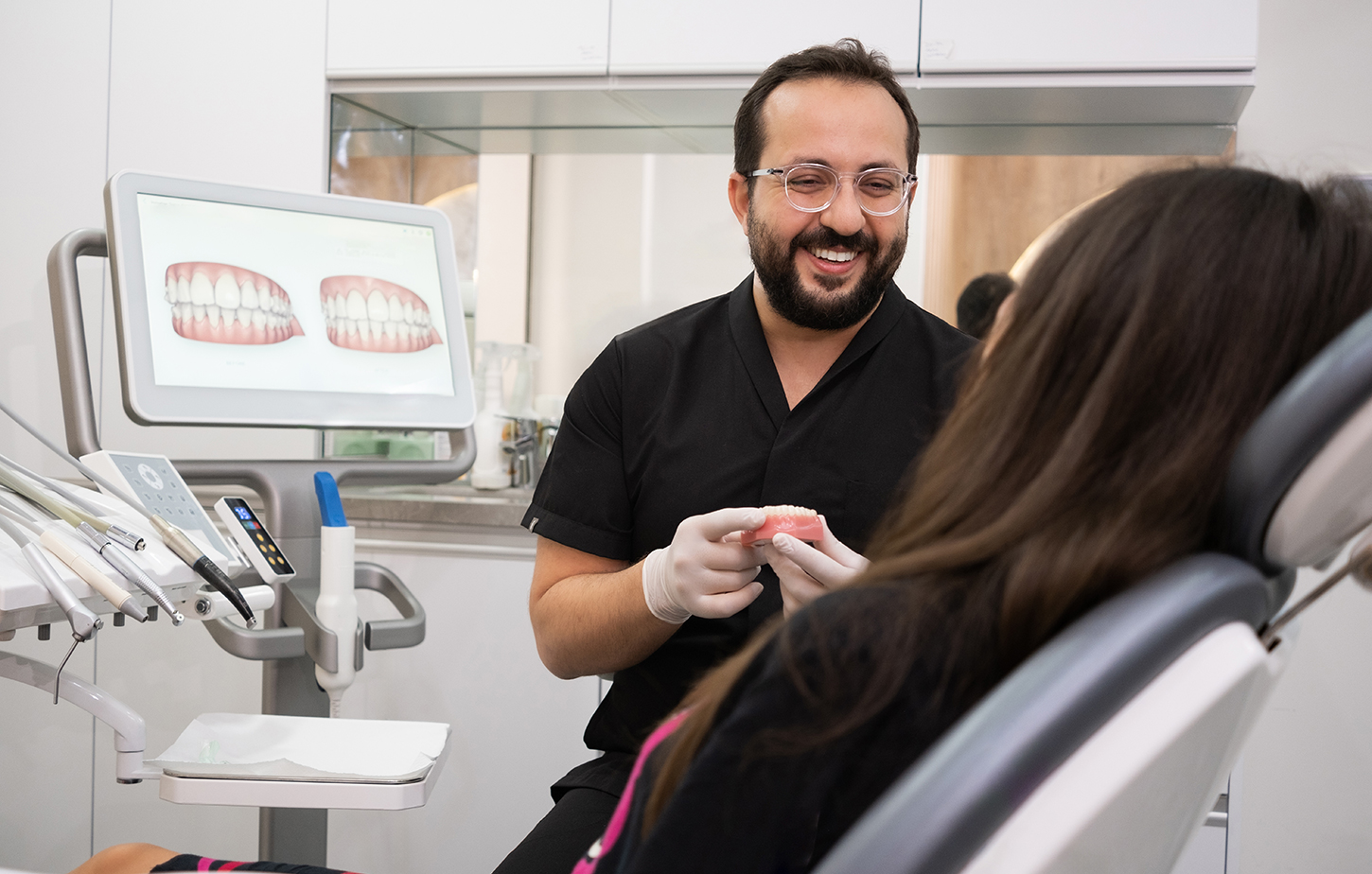Most people who get veneers do it for cosmetic reasons. But, people thinking about getting them often have a lot of questions about how veneers might affect their dental health. Do veneers harm or improve oral health? Will the teeth remain healthy under the veneers?
Here, we’ll answer some common questions about veneers and explain why they’re right for some but not for everyone.

How do Veneers Work?
Veneers act as a covering for teeth. Many people decide to get veneers to cover up stubborn tooth discoloration or fill in gaps or chips in teeth. The dentist sands down a small amount of enamel on the original tooth and applies the veneer shell onto the tooth with a special adhesive. Patients can get just one or two veneers or a whole set, depending on what they are trying to fix.
Veneers are typically made from either porcelain or a resin composite material. Both can mimic the appearance of natural teeth quite well, but porcelain is the stronger material and will last up to around 15 years while composite typically only lasts up to 10 years. However, porcelain veneers are also more expensive than composite.
Do Veneers Improve Oral Health?
While it’s usually not their primary purpose, veneers can have some dental health benefits depending on the issues a patient has. Here’s a breakdown of some health-related benefits of getting veneers:
Cavities, Gum Disease, and Decay Must be Fixed Beforehand
Teeth must be healthy and free of decay before veneers can be put on. So, anyone getting veneers will be required to address any cavities, gum disease, and decay before the procedure.
While the veneers aren’t directly fixing the problem, that little push to get these problems fixed is always helpful, since they will only get worse if left untreated. Treating decay and gum disease can also improve overall health.
Preventing Decay from Erosion
Tooth enamel plays an important role in protecting teeth, but it can get worn down by things like teeth grinding, acidic beverages, medications, or normal wear and tear. The more worn down tooth enamel gets, the easier it is for bacteria to cause tooth decay. Veneers can help prevent decay and further erosion in teeth with worn down enamel by providing another layer of protection.
Gap-Related Issues
Sometimes gaps can make it easier for bits of food to get caught in between teeth. If the food is not removed after eating, it can attract bacteria that cause decay in teeth. In addition, some gaps cause mild misalignments in teeth. Veneers can help fix these issues by filling in gaps and helping teeth fit together a little better.
Misaligned Bites
A misaligned bite can sometimes cause trouble with chewing, jaw pain and discomfort, or speech issues. While severely misaligned teeth need to be treated with braces or invisalign, some more minor cases can be fixed with veneers. These include teeth that are broken, slightly uneven, or worn down. Veneers can make the teeth fit together better and relieve these problems.
Mental Health Benefits
It’s no surprise that fixing cosmetic problems with teeth can improve confidence, but this confidence booster has also been shown to improve overall mental health. One study, conducted on 17 patients who got veneers, showed significant positive shifts in self esteem.
Another study highlighted the importance of self esteem improvement and its connection to overall mental health by showing how higher self esteem results in fewer problems with anxiety, depression, and attention disorders. So, improving self esteem with veneers can also lead to better mental health overall.

Do Teeth Stay Healthy Under Veneers?
Since a dentist will make sure that a patient’s teeth are healthy before getting veneers, they can stay healthy as long as good oral hygiene is maintained. Veneers do provide some extra protection, but cavity-causing bacteria can still get under them and cause decay.
As with natural teeth, veneers need to be flossed and brushed daily, and going to the dentist for regular check-ups and cleanings is still important. Maintaining a proper oral hygiene routine will not only prevent decay, but it can also help veneers last longer. Anyone experiencing tooth pain, sensitivity, or swelling should see a dentist, whether or not they have veneers.
Do Dentists Ever Advise Against Veneers?
Veneers can be a great improvement for some people, but they really aren’t for everyone. And in some cases, it might just be better to wait or try something else first. Here are a few reasons a dentist might advise against getting veneers:
- As mentioned above, if any tooth decay or gum disease exists, this will have to be fixed before getting veneers. Gum disease reversal isn’t something that can be done with a simple procedure, like filling a cavity. Depending on the severity, it might take months or years before gums heal enough to get veneers–if it’s possible at all.
- It is not usually advised for very young people, like teens, to get veneers. In some cases, their teeth may not yet be finished developing. Veneers are also an irreversible treatment, so it is likely that young people would have to replace them multiple times throughout their lives. This can be very expensive.
- If the teeth are too crowded or there is severe misalignment, it might be too difficult to apply veneers. A dentist might advise getting these problems fixed before getting veneers.
- Veneers may not be an option if a tooth is very damaged or broken. A crown might be advised instead to preserve the tooth’s health.
- In rare cases, dentists might not recommend getting veneers if the patient has severe health issues, like bleeding disorders or a condition causing a compromised immune system.
- If a patient has a known allergy to composite resin or dental adhesives, they won’t be able to get composite veneers. Porcelain veneers might still be possible if there are no allergies to the adhesives.

Find Out if Veneers are Right for You
Ultimately, only a dentist can tell whether someone is a good candidate for veneers or not. If so, there is a good chance that getting dental veneers can result in improved dental health. To find a dentist and schedule an appointment, use our handy dentist finder here.


